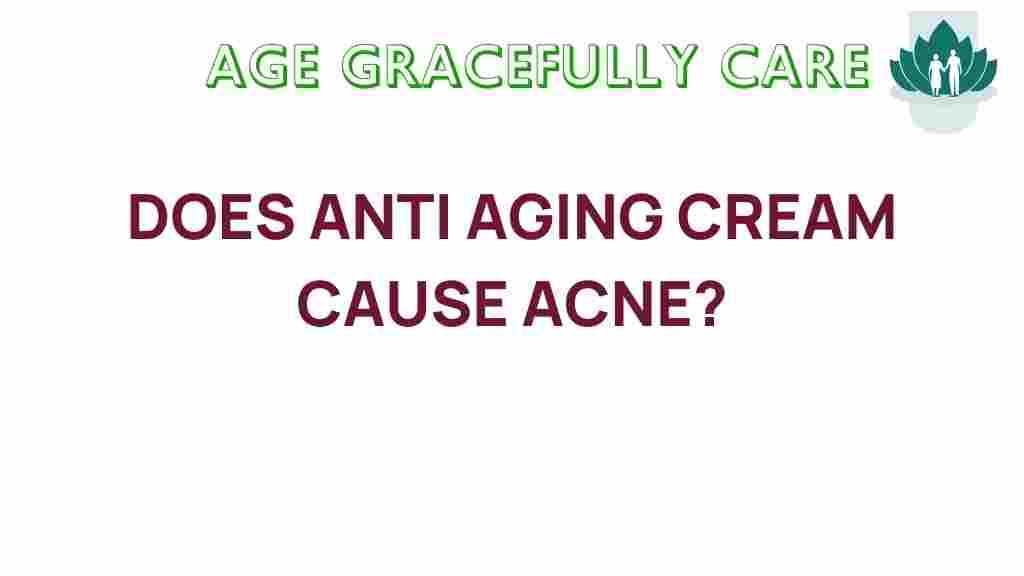The Surprising Connection: Can Anti-Aging Cream Trigger Acne?
As we age, the quest for youthful skin often leads us to explore various anti-aging cream options. These beauty products promise to reduce wrinkles, fine lines, and other signs of aging, making them a staple in many skincare routines. However, a surprising number of individuals report experiencing acne after incorporating these creams into their regimen. This article delves into the reasons behind this phenomenon and provides insights into maintaining optimal skin health while managing the signs of aging.
Understanding Anti-Aging Creams
Anti-aging creams are formulated with a variety of active ingredients designed to improve the appearance of the skin. Common ingredients include:
- Retinoids: Vitamin A derivatives that promote cell turnover.
- Peptides: Chains of amino acids that help to stimulate collagen production.
- Antioxidants: Such as vitamins C and E, which protect the skin from damage.
- Hyaluronic Acid: A powerful humectant that hydrates the skin.
- Alpha Hydroxy Acids (AHAs): Exfoliants that help to remove dead skin cells.
These components are effective at addressing signs of aging, but they can also lead to unwanted side effects, including acne.
Why Can Anti-Aging Creams Cause Acne?
Understanding the connection between anti-aging cream and acne involves examining how these products interact with different skin types. Here are some reasons why using anti-aging products may lead to breakouts:
- Comedogenic Ingredients: Some anti-aging creams contain oils or heavy emollients that can clog pores, leading to acne.
- Excessive Exfoliation: Ingredients like AHAs and retinoids can cause irritation or over-exfoliation, disrupting the skin barrier and resulting in breakouts.
- Skin Sensitivity: As we age, our skin may become more sensitive. Introducing potent anti-aging ingredients can trigger inflammatory responses, including acne.
- Hormonal Changes: The aging process can bring hormonal shifts that increase oil production, leading to acne.
The Role of Dermatology in Skincare Choices
Consulting a dermatologist is crucial when selecting beauty products, especially if you have a history of acne or sensitive skin. A dermatologist can guide you in choosing products that are effective for aging skin while minimizing the risk of breakouts. Here are some tips they may provide:
- Look for non-comedogenic labels to avoid products that clog pores.
- Choose lighter formulations, such as gels or serums, instead of thick creams.
- Gradually introduce new products to allow your skin to acclimate.
- Incorporate acne-fighting ingredients, such as salicylic acid, into your routine.
Step-by-Step Skincare Routine for Aging Skin Prone to Acne
Creating a balanced skincare routine is essential for promoting skin health and preventing acne while addressing aging concerns. Here’s a step-by-step guide:
Step 1: Cleanser
Start with a gentle, sulfate-free cleanser that effectively removes makeup and impurities without stripping the skin of its natural oils.
Step 2: Exfoliation (1-2 times a week)
Incorporate a mild exfoliant with AHAs or BHAs to promote cell turnover but avoid over-exfoliating, which can irritate the skin.
Step 3: Toner
Select a hydrating toner free of alcohol to prep your skin for subsequent products and restore pH balance.
Step 4: Treatment
Apply treatment products like retinoids or serums containing antioxidants. Start with lower concentrations if you have sensitive skin.
Step 5: Moisturizer
Use a lightweight, non-comedogenic moisturizer to hydrate your skin without clogging pores.
Step 6: Sunscreen
Daily application of broad-spectrum sunscreen is vital to protect aging skin from UV damage and prevent further signs of aging.
Troubleshooting: What to Do If You Experience Acne from Anti-Aging Cream
If you notice breakouts after starting a new anti-aging cream, consider the following steps:
- Discontinue Use: Stop using the product immediately to see if your skin clears up.
- Patch Test: Always patch test new products on a small area of skin before full application.
- Consult a Dermatologist: If acne persists, seek professional advice to determine the best course of action.
- Modify Your Routine: Adjust your skincare routine by incorporating soothing products to calm irritations.
Best Practices for Using Anti-Aging Products
To maximize the benefits of anti-aging creams while minimizing the risk of breakouts, follow these best practices:
- **Start Slowly:** Introduce new products gradually to observe how your skin reacts.
- **Stay Hydrated:** Drink plenty of water to maintain skin hydration from within.
- **Maintain a Balanced Diet:** Incorporate foods rich in antioxidants and healthy fats to support overall skin health.
- **Get Adequate Sleep:** Quality sleep is essential for skin repair and regeneration.
- **Manage Stress:** High stress can exacerbate acne, so practice relaxation techniques.
Conclusion
In conclusion, while anti-aging cream can be a powerful tool in the fight against the visible signs of aging, it is essential to be aware of its potential to trigger acne. By understanding the ingredients, consulting with a dermatologist, and adopting a thoughtful skincare routine, individuals can enjoy the benefits of these products without sacrificing their skin health. Remember, every skin type is unique, so what works for one person may not work for another. If you’re struggling with aging skin and acne, explore solutions that cater to both concerns for a balanced approach to your facial care.
For further reading on skincare routines and product recommendations, visit this skincare guide. To learn more about the latest in dermatology and skincare science, check out this resource.
This article is in the category Health and created by AgeGracefullyCare Team
